Foreword
Who are the great historical figures of Western
Europe who define its identity? The answers of the secular
world to this question are quite different from those of
the Church. The Western secular world exalts secular
figures like Charlemagne, Charles V, or Napoleon as
“great Europeans”. But all three of these left
Europe full of graves. Indeed, Charlemagne and Charles V
were renowned for their massacres and, as for Napoleon, he
declared that he would have had Christ hanged as a
fanatic.[1]
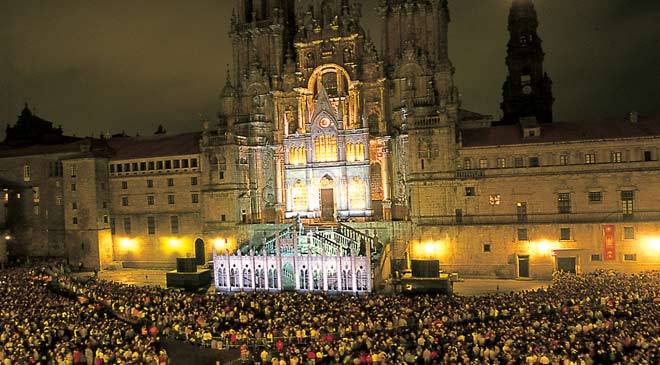 |
Crowd before an illuminated Santiago
cathedral during the festivity of
Saint James the Apostle.
Santiago de
Compostela, Photo: A Coruña,Turgalicia |
The catalogues of the
Church exclude all such tyrants, for the true
identity of Western Europe is defined not by them,
but by the thousands upon thousands of Western
Saints.
Here we have no space to mention the many
amongst them who achieved only local fame, but we can
at least mention some of the greatest, who obtained
international honor.
The Apostles
First and foremost, the
spiritual identity of Western Europe is closely
linked to the Chiefs of the Holy Apostles, Peter
(† c.64) and Paul († c.65). Both came
out of the East and were martyred in the West and the
latter founded the first church in Western Europe,
that in Rome. We also honor the memories of other
Apostles and Apostolic figures, who are in other ways
connected with the West. Among these is the Apostle
James
(†44), whose
sacred relics have been honored in Compostella in
Spanish Galicia for over a thousand years. Equally,
we remember Apostolic men from the East, such as St.
Ignatius of Antioch (c.107) and St. Justin Martyr
(c.165), both martyred in Rome, and St.
Irenaeus, († c.200),
martyred in Pyons in France.
These Apostolic figures were to inspire countless
others, who were to set out in later centuries as local
Apostles, to enlighten the different regions and provinces
of Western Europe. In the third and fourth centuries such
saints established the Church in south-western Europe, in
Italy, the Iberian Peninsula and Gaul, in the fifth and
sixth centuries in the Celtic West, in the seventh century
in England, and in the eighth to eleventh centuries in the
Germanic north-west.
The Martyrs
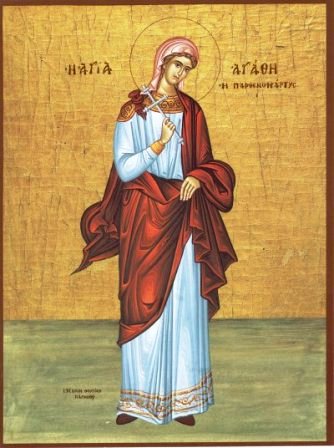 |
| St. Agatha. |
Secondly, we cannot overlook the host of martyrs of
the Imperial Capital and neighboring parts of the Empire.
Some of them are well-known, like St. Sophia and her three
children († 138), St.
Cecilia († 2nd cent), St.
Tatiana († 3rd century), St. Agatha († 3rd
century), St. Laurence († 258), St.
Valentine († c.270), St.
Sebastian († 288), St. Lucy
(† 304), St. Anastasia
(† c.304), St. Pancras
(†c.305), St.
Januarius († c.305), St. Agnes
(† c.350), many others are less
well known.
In other parts of the Empire there were others who
also helped shape the spiritual identity of Europe. In
Northwest Africa also there were many martyrs, for
instance, St. Perpetua and St. Felicity
(† 203), and St. Cyprian of
Carthage (# 258). In other parts of the West there were
many other martyrs, still relatively little known outside
their homelands, for example, St. Maurice of Agaunum in
Switzerland († c.287), St. Eulalia of Merida
(† 304), St. Vincent of
Spain († 304), St. Alban
the Protomartyr of Britain († c.305), or St. Ursula
in Germany (5th cent).
The Confessors
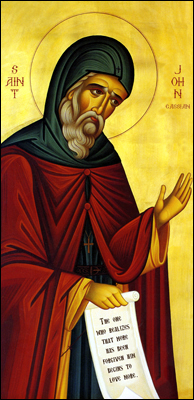 |
| St. John Cassian |
Thirdly,
after these martyrs who sowed the seeds of the
Church, there came others to sow and then harvest.
There came Church Fathers such as St. Hilary of
Poitiers († c.368), St. Ambrose of Milan
(† 397), the Church writers Blessed Jerome of
Stridon († 420) and Blessed Augustine of Hippo
(† 430), Fathers such as St. John
Cassian
(†435), St.
Vincent of Perins
(†450), St.
Leo the Great
(†461), and
later St. Gregory the Great († 604) and
St. Martin I
(† 655). And we should not
fail to remember one who, though not a Church Father,
is a great confessor who shone forth in Rome, St.
Alexis († 5th
century), the Man of God.
Similarly there are the great monastic founders and
organizers of the Church, especially in heathen northwest
Europe. For instance, in Gaul there were St. Martin of
Tours († 397), who inspired St.
Ninian († 432) in
Pictish Scotland and St. Patrick in Ireland
(† c.461). In Italy, there was the great St.
Benedict of Nursia
(† c.550). In Frankish Gaul
there were St. Remigius (Remi)
(†553), who
baptized Clovis, St. Germanus of Paris
(†561), St. Eloi
(† 660) and St. Peger
(† 679). In Iberia, there were
St. Leander of Seville († c.601), St. Isidore of
Seville († 636), St. lldefonsus (Alphonso) of
Toledo († 666) and St. Julian of Toledo (†
690). On the Germanic Marches there are also two great
Apostles of the Lowlands, St. Lambert († c.705) and
St. Hubert of Maastricht (+ 727).
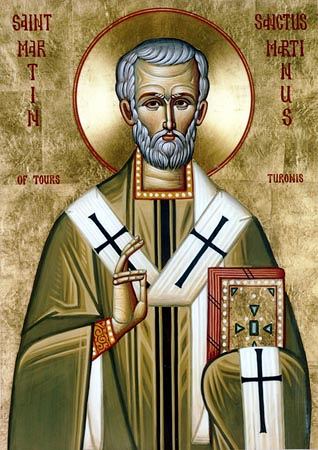
Here
we should not overlook the role played by women. The
Orthodox West had not only founders, but also
foundresses, in many ways it owed its conversion more
to holy women and princesses than to princes. The
first here is not a princess, but certainly a
princess of the spirit, St. Monica († 387),
who outshone her son, Bishop Augustine, by her
holiness. Then there are St. Genevieve of Paris
(† c.500), St. Clotilde († 545), St.
Radegund († 587) and St. Bathilde (†
680). Before them in Ireland there had already been
St. Brigid († c.525), and after them in
England came St. Audrey († 679) and St. Hilda
(† 680). Their activities in the West mirror
the activities of other holy foundresses further east
much later, for example, the Bohemian St. Ludmila
(† c.925) in the Czech Lands and the Swedish
St. Olga (Helga) († 969) in Kiev.
In the Isles the work of
St. Patrick, mentioned above, was continued by the
founder of monastic Ion a, St. Columba (†
597). And his work in turn later inspired St. Aidan
(† 651) to found the monastic centre of
Lindisfarne in the northeast of England. In the south
of England there was the organizer St. Augustine of
Canterbury († c.604). These all inspired kings
and princes, for instance, St. Ethelbert (†
616), St. Edwin († 633) and St. Oswald
(† 642). In the later seventh century the work
of these figures was continued by the Greek St.
Theodore of Canterbury († 690) and St.
Cuthbert of Lindisfarne († 687). Their work
was in its turn continued into the early eighth
century by St. Guthlac of Crowland (†714) and
St. Bede the Venerable († 735). The piety of
the Isles had already overflowed into Western Europe
with St. Columbanus († 615) and St. Gall
(† 630) in Switzerland. Their work was to be
continued and organized in the eighth century by two
English missionaries, St. Willibrord (Clement) in the
Netherlands († 739) and the martyr St.
Boniface (Winfrith) in the German Lands (†
754).
There
were also later martyrs, particularly in the ninth
century. Firstly, there were those under the Muslims
in Spain, especially Cordoba, such as those recorded
by St. Eulogius († 859). Then, especially in
England, there were the many martyrs under the Danish
Vikings, such as St. Edmund († 869). They were
followed by later builders and restorers of the
Church, workers of the eleventh hour. These include
those in the Scandinavian Lands, such as St. Anschar
(Oscar) († 865) in Denmark, St. Olaf (†
1029) in Norway and St. Sigfrid († c.1045) in
Sweden. As regards the martyrs of England, they laid
the foundations for the later restorers of monastic
life, such as St. Ethelwold († 984), St.
Dunstan († 988) and St. Oswald (†
992).
Afterword
After a thousand-year-long apostasy and as,
seemingly, we re-enter pagan times, there are those who
consider that the Christian history of Western Europe is a
thing of the past. This is a negative and fatalistic
viewpoint. The spiritual identity of Western Europe is not
beyond recovery. The final word in history has not yet
been spoken. However, if Western Europe is to be recovered
for Christ, this will only come to pass through the pure
seeds of its Conversion, on the foundations laid by the
above Great Europeans.
From
Orthodox England, 2004



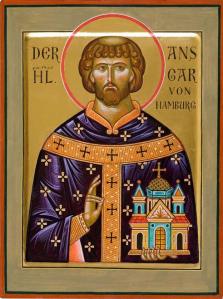


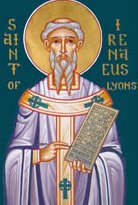

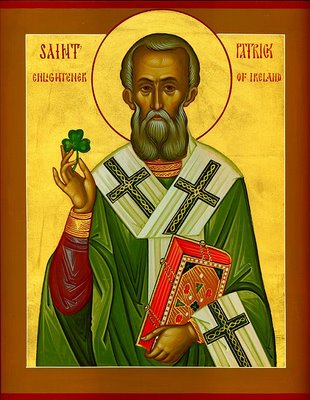




No comments:
Post a Comment